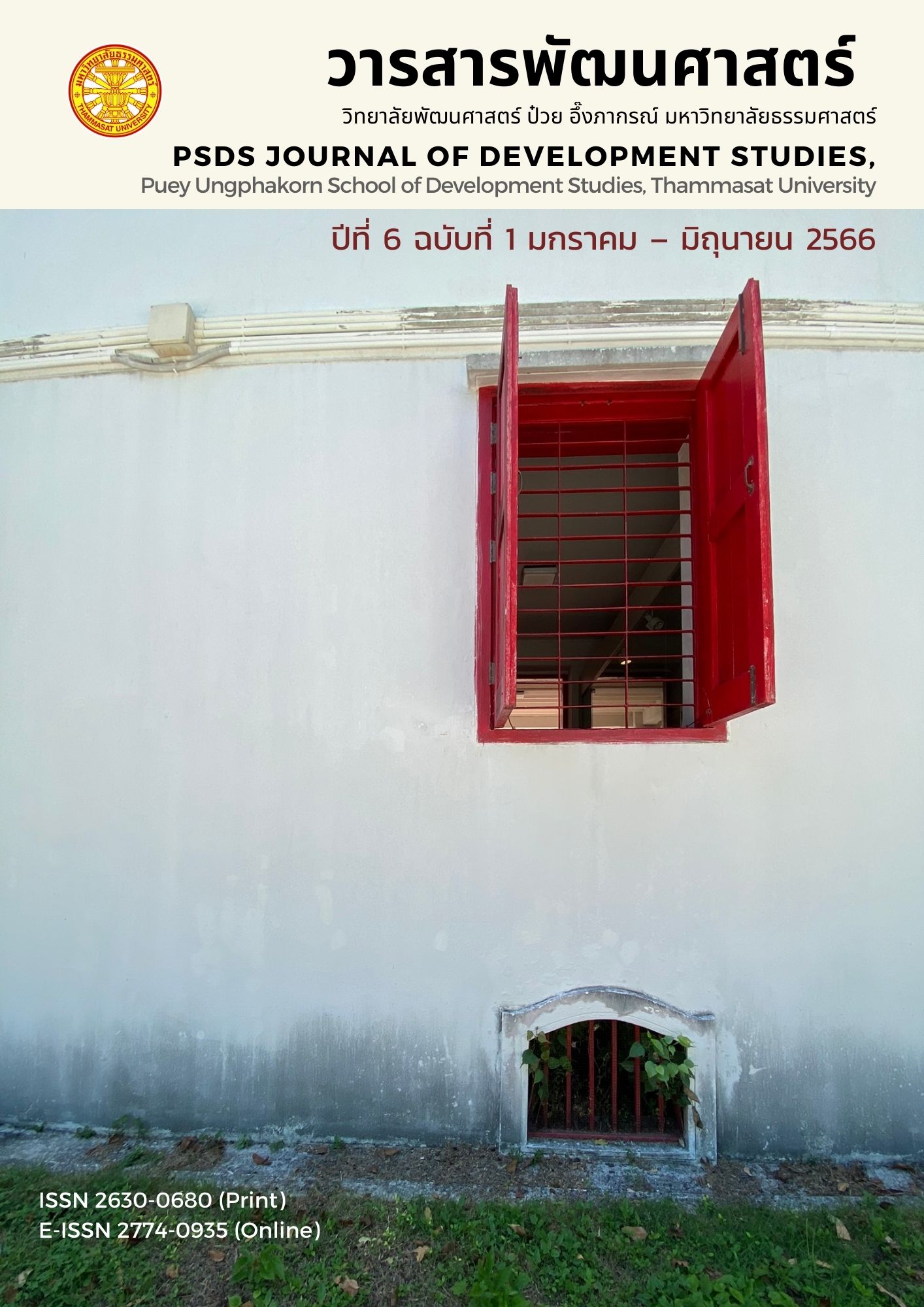อำนาจเหนือชีวิต สภาวะตัวตน และศักยภาพกระทำการในจังหวัดชายแดนใต้
คำสำคัญ:
อำนาจเหนือชีวิต , สภาวะตัวตน , ศักยภาพกระทำการ , เหตุการณ์ความไม่สงบ , จังหวัดชายแดนใต้บทคัดย่อ
บทความนี้มีวัตถุประสงค์เพื่อศึกษาอำนาจเหนือชีวิตในจังหวัดชายแดนใต้ การบ่มเพาะบุคคลของอำนาจเหนือชีวิต รวมถึงการสร้างตัวตนและการแสดงศักยภาพกระทำการของบุคคลผ่านอำนาจเหนือชีวิตดังกล่าว โดยอาศัยหมู่บ้านใน อ.รามัน จ.ยะลา เป็นพื้นที่วิจัย และอาศัยการศึกษาภาคสนามซึ่งประกอบด้วยการสัมภาษณ์และการสังเกตเป็นวิธีวิจัยหลัก เสริมด้วยการวิจัยเอกสาร ผลการวิจัยพบว่าผู้มีอำนาจเหนือชีวิตในพื้นที่ประกอบด้วย ทหาร ผู้นำทางการ ผู้ก่อความไม่สงบ และผู้ประกอบธุรกิจผิดกฎหมาย ซึ่งแต่ละกลุ่มมีที่มาของอำนาจต่างกัน ทหารจาก “กฎหมายพิเศษ” ผู้นำทางการจากการถ่ายโอนอำนาจอย่างไม่เป็นทางการจากทหาร ผู้ประกอบธุรกิจผิดกฎหมายจากการสัมพันธ์กับเจ้าหน้าที่นอกแถวและปฏิบัติการของเจ้าหน้าที่ และผู้ก่อความไม่สงบจากการตีความศาสนาอิสลาม โดยผู้มีอำนาจเหนือชีวิตแต่ละกลุ่มบ่มเพาะบุคคลด้วยกลวิธีแตกต่างกัน ทหารอาศัยรัฐพิธี ผู้นำทางการใช้การอุปถัมภ์ค้ำชู ผู้ก่อความไม่สงบใช้ศาสนา ส่วนผู้ประกอบธุรกิจผิดกฎหมายใช้ความรุนแรง ซึ่งไม่ได้ประสบความสำเร็จอย่างสมบูรณ์ เพราะประสบ การขัดขืน อีกทั้งยังเป็นเงื่อนไขให้บุคคลสร้างตัวตนที่แตกต่างขึ้นมา และโดยเฉพาะอย่างยิ่งคือเป็นแหล่ง อิงอาศัยในการแสดงศักยภาพกระทำการของบุคคล อย่างไรก็ดี การสร้างตัวตนและการแสดงศักยภาพกระทำการผ่านอำนาจเหนือชีวิตในลักษณะเช่นนี้ไม่เอื้อต่อการอยู่ร่วมกันอย่างเสมอหน้า และเป็นสาเหตุหนึ่งที่ทำให้เหตุการณ์ความไม่สงบในพื้นที่ยังดำเนินต่อไป จึงจำเป็นต้องยุติเงื่อนไขที่ก่อให้เกิดอำนาจเหนือชีวิตขึ้นมา ได้แก่ กฎหมายพิเศษ ความสัมพันธ์ทางสังคมแบบลำดับขั้น และการผูกขาดความถูกต้องชอบธรรมจากศาสนา เพื่อที่จะคลี่คลายปัญหาที่คนในพื้นที่ประสบได้
Downloads
เอกสารอ้างอิง
ศรยุทธ เอี่ยมเอื้อยุทธ. (2551). “ปาเยาะห์เนาะยาดีนายู” (มันยากที่จะเป็นนายู): ความเป็นชาติพันธุ์ ความหมาย และการต่อรองของมลายูในชีวิตประจำวัน [วิทยานิพนธ์ปริญญามหาบัณฑิต ไม่ได้ตีพิมพ์]. มหาวิทยาลัยธรรมศาสตร์.
ศรีสมภพ จิตร์ภิรมย์ศรี และรอมฎอน ปันจอร์. (2556). ไฟใต้กับการริเริ่มสันติภาพแห่งเดือนรอมฎอน 2556: ความรุนแรงที่ยืดเยื้อจะต้องถ่วงดุลด้วยพลังสันติภาพเท่านั้น [เอกสารไม่ได้ตีพิมพ์]. ศูนย์เฝ้าระวังสถานการณ์ภาคใต้.
ศรีศักดิ์ วัลลิโภดม. (2550). เล่าขานตำนานใต้. ศูนย์สันติศึกษาและการพัฒนา มหาวิทยาลัยมหิดล.
Abuza, Zachary. (2003). Militant Islam in Southeast Asia: Crucible of Terror. Lynne.
Agamben, Giorgio. (1998). Homo Sacer: Sovereign Power and Bare Life. Translated by Daniel Heller-Roazen. Stanford University Press.
(2005). State of Exception. Translated by Kevin Attell. University of Chicago Press.
Anderson, Benedict. (1996). Imagined Communities: Reflections on the Origin and Spread of Nationalism. Verso.
Askew, Marc. (2007). Conspiracy, Politics, and a Disorderly Border: the Struggle to Comprehend Insurgency in Thailand’s Deep South. East-West Center Washington, and ISEAS.
(2009). Landscape of Fear, Horizons of Trust: Villagers Dealing with Danger in Thailand’s Insurgent South. Journal of Southeast Asian Studies, 40(1).
Buur, Lars. (2005). The Sovereign Outsourced: Local Justice and Violence in Port Elizabeth. In Thomas Blom Hansen and Finn Stepputat (eds.), Sovereign Bodies: Citizens, Migrants, and States in the Postcolonial World. Princeton University Press.
Che Man, Wan Kadir. (1990). Muslim Separatism: The Moros of Southern Philippines and the Malays of Southern Thailand. Oxford University Press.
Croissant, Aurel. (2005). Unrest in South Thailand: Contours, Causes and Consequences Since 2001. Contemporary Southeast Asia, 21(1).
Dorairajoo, Saroja D. (2006). Khao Yam Violence: A Survey of Some of the Factors Contributing to the Violence in Southern Thailand. Asian Cultural Studies Special Issue, 15.
Foucault, Michel. (1991). Governmentality. In Graham Burchell, Colin Gordon and Peter Miller (eds.), The Foucault Effect: Studies in Governmentality. University of Chicago Press.
(1997). Ethics: Subjectivity and Truth. Edited by Paul Rabinow, translated by Robert Hurley et.al. The New Press.
Frisk, Sylva. (2009). Submitting to God: Women and Islam in Urban Malaysia. NIAS Press.
Hansen, Thomas Blom, and Finn Stepputat. (2006). Sovereignty Revisited. Annual Review of Anthropology, 35.
Hansen, Thomas Blom, and Finn Stepputat. (eds.). (2005). Sovereign Bodies: Citizens, Migrants, and States in the Postcolonial World. Princeton University Press.
Jensen, Steffen. (2005). Above the Law: Practices of Sovereignty in Surrey Estate, Cape Town. In Thomas Blom Hansen and Finn Stepputat (eds.), Sovereign Bodies: Citizens, Migrants, and States in the Postcolonial World. Princeton University Press.
Jitpiromsri, Srisompob, and Sobhonvasu, Panyasak. (2006). Unpacking Thailand’s Southern Conflict: The Poverty of Structural Explanations. Critical Asian Studies, 38(1).
Liow, Joseph Chinyong. (2006). International Jihad and Muslim Radicalism in Thailand?: Toward and Alternative Interpretation. Asia Policy, 2.
Mahmood, Saba. (2005). Politics of Piety: The Islamic Revival and the Feminist Subject. Princeton University Press.
McCargo, Duncan. (2006). Thaksin and the Resurgence of Violence in the Thai South: Network Monarchy Strikes Back? Critical Asian Studies, 38(1).(2007). Rethinking Thailand’s Southern Violence. Singapore University Press.
(2008). Tearing Apart the Land: Islam and Legitimacy in Southern Thailand. Cornell University Press.
McNay, Louis. (2000). Gender and Agency: Reconfiguring the Subject in Feminist and Social Theory. Polity Press, Blackwell.
Ong, Aihwa. (2003). Buddha is Hiding: Refugees, Citizenship, the New America. University of California Press.
Pathmanand, Ukrist. (2006). Thaksin’s Achilles’ Heel: The Failure of Hawkish Approaches in the Thai South. Critical Asian Studies, 38(1).
Sugunnasil, Wattana. (2006). Islam, Radicalism, and Violence in Southern Thailand: Berjihad di Patani and the 28 April 2004 Attacks. Critical Asian Studies, 38(1).
Unno, Anusorn. (2019) “We love Mr. King.”: Malay Muslims of Southern Thailand on the Wake of the Unrest. ISEAS.
ดาวน์โหลด
เผยแพร่แล้ว
รูปแบบการอ้างอิง
ฉบับ
ประเภทบทความ
สัญญาอนุญาต
ลิขสิทธิ์ (c) 2023 อนุสรณ์ อุณโณ

อนุญาตภายใต้เงื่อนไข Creative Commons Attribution-NonCommercial-NoDerivatives 4.0 International License.






